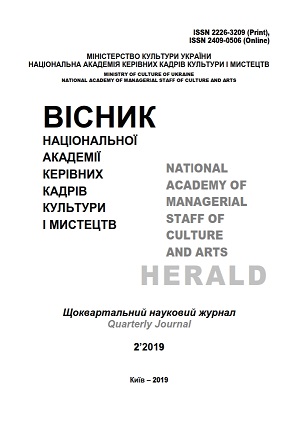Посткультура в контексті трансгуманізму
Postculture in the Transhumanism Context
Author(s): Fedir Pavlovich Vlasenko, Yevheniia Viktorivna Levcheniuk, Dmytro Anatoliyovych TovmashSubject(s): Social Philosophy, Culture and social structure , Social development, Sociology of Culture
Published by: Національна академія керівних кадрів культури і мистецтв
Keywords: individual; society; culture; postculture; humanism; transhumanism;
Summary/Abstract: The purpose of the article is to implement the social-philosophical analysis of the “man-technology” relations in the conditions of culture transformation and deployment of transhumanism. Methodology. The theoretical and methodological basis of the research is the conceptual approaches of the national and foreign researchers who study globalization and its social and cultural consequences. That includes the works of such scholars as L. Althusser, J. Bodrijar, G. Wells, M. Epstein, V. Kutyriov, M. Foucault,F. Fucuyama, I. Frolov, V. Chekletsov and others. Both general scientific and philosophical methods have been used in the research, including analysis, synthesis, the dialectic method, the phenomenological one, the hermeneutic one, the comparative one and others. The scientific novelty is the socio-philosophical analysis of the contemporary socio-cultural transformations which are caused by the mankind’s scientific and technological progress and are characterized by being dehumanization of a separate individual as well as of the society in whole. Conclusions. Nanotechnologies, biotechnologies, and informatization do not only determine the further culture development, but they also change the modern man’s outlook in which real, natural and objective things are being replaced with artific ial, virtual and simulated ones. As a result, an individual is disoriented in his or her value orientations and identity, his or her worldview appears to be fragmentary and his or her behavior becomes unpredictable. Thus, an individual turns from being the subject of an action into the object of the technosphere and he or she does not understand that the results of his or her work (Internet, social networking, modern communication facilities) should not replace the world (natural, social). They are just ways to increase work productivity.
Journal: Вісник Національної академії керівних кадрів культури і мистецтв
- Issue Year: 2019
- Issue No: 2
- Page Range: 166-170
- Page Count: 5
- Language: Ukrainian

